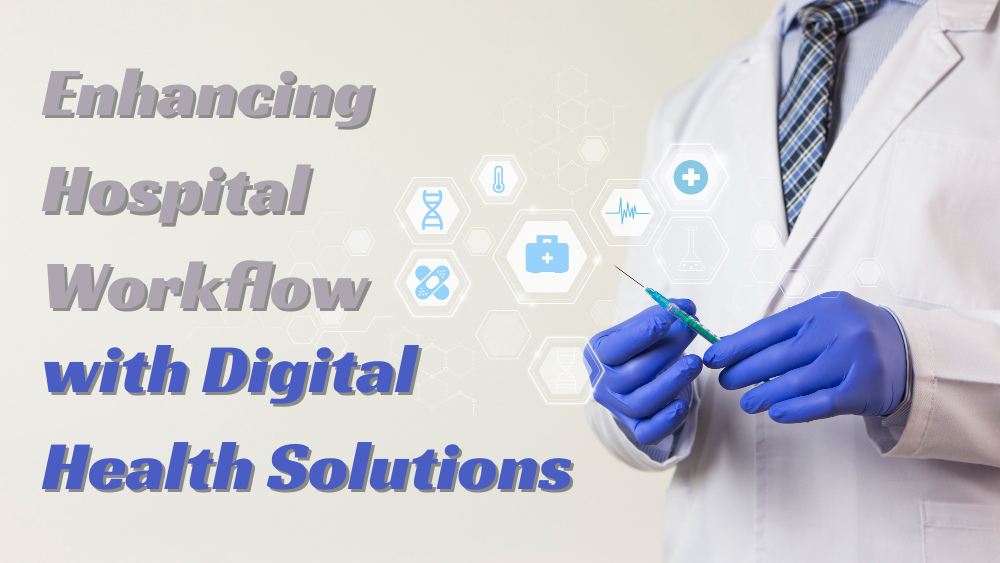Enhancing Hospital Workflow with Digital Health Solutions
- 1 The Promise of Digital Health Solutions
- 1.1 Streamlining Administrative Processes
- 1.2 Enhancing Clinical Decision Making
- 1.3 Facilitating Seamless Communication
- 1.4 Overcoming Implementation Challenges
- 1.5 Addressing Technical and Compatibility Issues
- 1.6 Ensuring Data Privacy and Security
- 1.7 Navigating Cultural and Organizational Changes
- 1.8 Strategies for Successful Implementation
- 1.9 Engaging Stakeholders
- 1.10 Phased Implementation
- 1.11 Continuous Evaluation and Adaptation
- 2 Conclusion
Integrating digital health solutions into hospital workflows represents a transformative shift in healthcare management, offering many benefits to healthcare providers and patients. By leveraging digital health technologies such as electronic health records (EHRs), telemedicine platforms, and mobile health applications, hospitals can streamline administrative processes, optimize resource allocation, and facilitate seamless communication and collaboration among care teams.
Adopting digital health solutions promises to increase efficiency within hospital workflows, enabling healthcare providers to devote more time to direct patient care and reducing the burden of administrative tasks. Moreover, digital health technologies have the potential to minimize errors and improve patient safety by standardizing clinical processes, enhancing medication management, and facilitating real-time access to patient information. Additionally, integrating digital health solutions into hospital workflows can empower patients to take a more active role in their healthcare management through remote monitoring, patient portals, and self-management tools, fostering patient engagement and adherence to treatment plans.
However, successfully implementing digital health solutions in hospital settings is not without its challenges. Healthcare organizations must navigate interoperability, data security, and regulatory compliance to ensure the seamless integration and effective utilization of digital health technologies. Furthermore, addressing resistance to change and providing comprehensive training and support for healthcare providers are essential steps in overcoming barriers to adoption and maximizing the benefits of digital health solutions.
Collaborating with reputable provider credentialing services further enhances the efficacy of hospital workflows by ensuring the competence and qualifications of healthcare providers, thereby safeguarding patient safety and quality of care. In conclusion, integrating digital health solutions into hospital workflows represents a significant opportunity to revolutionize healthcare management, driving improvements in efficiency, patient outcomes, and overall quality of care. Through strategic planning, stakeholder engagement, and ongoing evaluation, healthcare organizations can harness the transformative potential of digital health technologies to optimize hospital workflows and deliver high-quality, patient-centered care.
The Promise of Digital Health Solutions
Digital health solutions, encompassing electronic health records (EHRs), telehealth platforms, mobile health apps, and advanced analytics, offer a comprehensive toolkit for revolutionizing hospital operations. These technologies can streamline administrative processes, enhance clinical decision-making, and facilitate seamless communication among healthcare professionals.
Streamlining Administrative Processes
One of the most immediate benefits of digital health solutions is their ability to streamline administrative tasks. By automating patient intake, scheduling, and billing, hospitals can reduce wait times, minimize administrative errors, and free up staff to focus on patient care. EHRs play a pivotal role by centralizing patient information and making it accessible to healthcare providers across different departments and healthcare facilities.
Enhancing Clinical Decision Making
Digital health technologies also enhance clinical decision-making. By integrating artificial intelligence (AI) and machine learning algorithms, EHRs can analyze vast amounts of data to provide clinicians with evidence-based recommendations, predictive analytics, and personalized treatment plans. Moreover, wearable devices and remote monitoring tools enable continuous patient monitoring, alerting healthcare providers to potential issues before they become critical.
Facilitating Seamless Communication
Effective communication among healthcare providers is crucial for coordinated care and patient safety. Digital health solutions facilitate this by providing platforms for real-time information exchange. Telehealth platforms, for instance, allow for virtual consultations, enabling multidisciplinary teams to collaborate on patient care regardless of geographical barriers.
Overcoming Implementation Challenges
Despite the clear benefits, integrating digital health solutions into hospital workflows is challenging. These include technical issues, data privacy and security concerns, and the need for significant cultural and organizational changes.
Addressing Technical and Compatibility Issues
Technical challenges, such as system incompatibilities and the need for robust IT infrastructure, can impede the seamless integration of digital health technologies. Hospitals must invest in compatible systems and ensure that their IT infrastructure can support these technologies.
Ensuring Data Privacy and Security
Data privacy and security are paramount, given the sensitive nature of health information. Hospitals in the United States must comply with regulations such as HIPAA, ensuring that digital health solutions have robust security measures to protect patient data from breaches.
Navigating Cultural and Organizational Changes
Implementing digital health solutions requires significant cultural and organizational changes. This includes training staff to use new technologies and adapting workflows to incorporate these tools effectively. Resistance to change is a common obstacle, necessitating strong leadership and clear communication about the benefits of digital health technologies.
Strategies for Successful Implementation
Hospitals should adopt a strategic approach that includes stakeholder engagement, phased implementation, and continuous evaluation for a successful transition to digital health solutions.
Engaging Stakeholders
Engaging stakeholders, including healthcare providers, IT staff, and patients, in the planning and implementation process is crucial. Their input can identify potential issues, ensure solutions meet user needs, and increase buy-in.
Phased Implementation
A phased implementation approach allows for the gradual integration of digital health solutions, minimizing disruption and allowing adjustments based on feedback and early outcomes.
Continuous Evaluation and Adaptation
Continuous evaluation of digital health solutions’ impact on workflow efficiency, patient outcomes, and staff satisfaction is essential. This feedback loop enables ongoing refinement of the technologies and their integration into hospital workflows.
Conclusion
Digital health solutions have immense potential for enhancing hospital workflows, efficiency, and patient care. While challenges exist, strategic planning, stakeholder engagement, and a commitment to continuous improvement can pave the way for successful integration. As hospitals navigate this digital transformation, they stand to benefit from a more coordinated, data-driven, and patient-centered approach to healthcare.

















